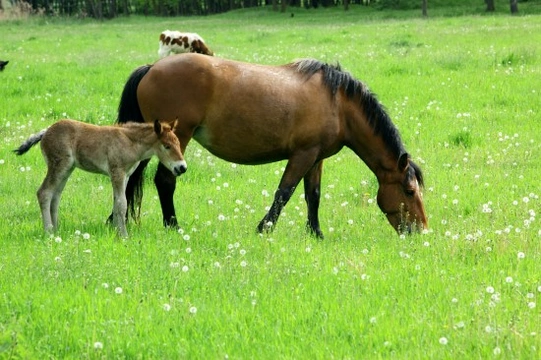
How to Improve Grazing For Horses & the Dangers of Dredging
Over the last few years, the UK has been subject to some of the wettest weather ever and it never seemed to stop. The winter months were unbelievably wet and it just continued which left many horse owners at their wits end and struggling to keep their horses on half decent paddocks. Even with the onset of the better and warmer weather, fields are still not looking as good as they should at this time of the year and more importantly lacking the vital nutrients needed to keep horses healthy even though the grass may look lush.
Many horse owners are complaining that although their grass is growing, it doesn't appear to be that palatable which is a real problem as horses are just turning their noses up at it when they are put out to pasture. Experts suggest that if you are worried about the state of your paddocks, the money it costs to have them"soil tested" would be money well spent. The average cost of a soil test is around £20 which means it is an affordable option that offers you peace of mind.
After a soil test has been done, experts would be in position to advise on which fertilizers to use to enhance the quality of the grass ensuring the products are safe when used around horses. You can find specifically formulated fertilizers which are safe for horses to be turned out on immediately after it's been put on the paddock.
Best Time to Fertilize
Although fertilizing a paddock should be done a little earlier in the year, having them done in June is not too late as the process will still enhance the condition of the grass and since there has been a lot of rain this year, it makes it a feasible option. If however, there had been a dry period, fertilizing in June would have been left a little too late and therefore a waste of time and money.
Are Your Paddocks Full of Weeds?
Because it has been so wet, you may have found that weeds have taken over which can be a real problem because they will smother any grass that's trying to push through. One of the biggest problems are buttercups which can be quite harmful to horses causing them to suffer blisters around their mouths which then turns very sore. This is a condition known as "buttercup burn" and it causes blisters because the weed contains a mild irritant. Another real problem with buttercups is that if a horse eats too many, it can cause them to have diarrhoea and even to suffer a mild colic.
Is Spraying a Paddock Safe?
It's really important to get a buttercup or other weed problem under control before their roots really set in and are allowed to grow very long. The problem is that to get rid of weeds effectively, paddocks need to be sprayed and this means keeping the horses off them for at least a couple of weeks – but this does depend on the product that's been used. But the question is when would it be the right time to do spray and the answer is before any thistles and docks have not gone to seed. If you wait too long and they do go to seed, you'd be wasting your time and money because the weeds will just come back.
Good Grass Management is Vital
Having good grass is not a luxury, it is an essential part of owning horses. Rolling, topping and collecting manure regularly has to be part of an ongoing routine and schedule where resting a paddock and having it grazed by sheep is all part of it. As such taking care of paddocks is as important as any other factor that goes into horse management.
Improving Drainage is an Option
With so many paddocks and fields having been underwater, many people are now realising the importance of good drainage and as such are improving this on their land. Naturally, the only time drainage can be improved is when the weather permits and when the ground is dry enough for heavy machinery to go over it. With the summers being so unpredictable, it's essential to start the work now because next month it might just turn too wet again and therefore machinery needed to improve the condition of existing drains or to put new ones in, would not be a feasible option.
The Dangers Associated with Dredging
A policy which is now in place is to dredge as a way to prevent any flooding next year but this is potentially dangerous for horse owners because hemlock water dropwort may be left on pastures where horses graze and it's extremely toxic to all equines!
It's really important to find out whether land you rent or own will be affected and you can do so by contacting the local authority. If the land is going to be affected, it cannot be stressed strongly enough the importance of ensuring that everything dredged up is removed from the land as soon as possible and before any horses are turned out onto it. Turning a horse out onto a fouled paddock in the morning and then going to work might see you coming back in the afternoon to find your horse dead in the paddock!



